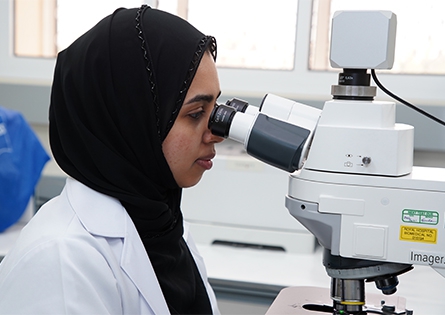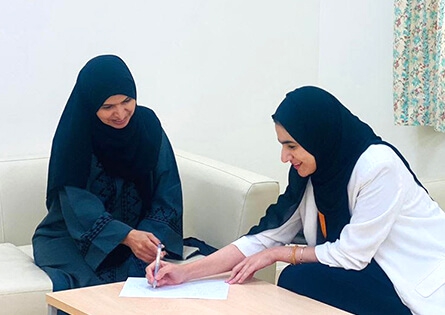
A center of excellence for Genomic science
We are a dedicated specialized center providing an excellent clinical genetics and genomics laboratory service to the nation.
The Center is a valuable genomics hub of highly trained Omani geneticists and medical professionals working together to improve and invest in the wealth of the Omani genetics data.
The Center works in full capacity to provide high-quality patient-centered care service providing a specialized facility for advanced, high-throughput genetics laboratory service with the required Genetic Counseling, Education and specialized genetics clinics.
The NGC also provides clinical genetic service through several specialized clinics that were commenced in the centre from January 2016, as well as providing counseling and education to the patients, both children and adults and their families. Currently the NGC consists of two main departments: department of Genetic Counseling and Education, and Department of Genetic Laboratories. In addition, there are two supportive departments, department of Administration and Finance and department of Co-ordination and Follow-Up.
a. Karyotyping of blood samples: for urgent samples from newborn babies and pregnant women and non-urgent referrals from patients with pregnancy loss, children with learning difficulties, physical disabilities, impaired physical or sexual development.
b. Karyotyping of bone marrow for hematological disorders: for suspected hematological cancer with any acquired chromosome abnormality using bone marrow (diagnostic and prognostic).
c. Molecular Cytogenetics:
- Fluorescence In Situ Hybridization (FISH): for molecular chromosomal abnormalities where chromosome specific probes and paints are used to determine chromosome changes can’t be identified by microscopy (high detection and clearer picture of chromosome abnormalities).
- Post-natal and pre-natal (Amniotic Fluid) Aneuploidy testing by QF-PCR
d. Genomic Microarray: using CytoScan HD (Affymetrix) analysis-platform for genomic array as the golden standard due to its high resolution (1 marker per ~880 bp), allowing detection of all well described microdeletion and microduplication syndromes. In total, the array includes 2.7 million markers (of which 750’ are SNPs) across the entire genome.
a. Diagnosis of hemoglobinopathies
The most common hereditary conditions causing anemia worldwide are the Hemoglobinopathies which are caused by abnormal synthesis of haemoglobin. Most Haemoglobinopathies and Thalassaemias can be diagnosed by CBC and HPLC and do not require further testing. Referral to genetic testing is usually recommended for the complex cases or un-explained anemia or borderline values of Hemoglobin A2 (HbA2) that can be detected by HPLC.
To facilitate the national wide program for pre-marital counseling and to facilitate Ministry of Health objective to reduce blood disorders in Oman, the following tests are routinely performed at National Genetic Center:
- 1. α-thalassaemia: genes are screened by using GAP-PCR, DNA sequencing and Multiplex Ligation-dependent Probe Analysis (MLPA) to detect deletional and non deletional mutations.
- 2. β-thalassaemia: β globin gene sequencing to screen for β thal point mutations and variants like HbS, HbD, HbC, HbE...etc ; and MLPA testing to detect the large deletions.
- 3. δ thalassaemia: sequencing for point mutations and δ variants .
b. Molecular diagnosis of hematological cancer & coagulation disorders
Optimization of molecular techniques in the diagnosis and management of Leukemia was completed by almost year 2015. The load these tests were fully implemented by 2016, as follows:
- ALL, AML & APL (qualitative analysis)
- CML (qualitative) & ABL1 Kinase Domain mutation status
- Major BCR-ABL1 (p210) quantification
- Myeloproliferativeneoplasia (MPN)
- Thrombophilia (Factor II &Factor V Leiden)
c. Molecular diagnosis of Solid Tumors
- Breast cancer service: BRCA1 & BRCA2 test was introduced in order to improve breast cancer patients’ management and screening of their relatives when indicated.
- Colorectal cancer: Status of KRAS & NRAS genes (wild-type or mutant) in metastatic colorectal tumours determines responsiveness to anti-EGFR therapy (Erbitux/Cetuximab or Panitumumab). KRAS is mutated in 40% of metastatic colorectal cancers while NRAS is mutated in 10% of cases. Patients with RAS mutation (KRAS or NRAS) who account for 50% of total metastatic colorectal cancers do not benefit from anti-EGFR therapy.
d. Molecular diagnosis of Cystic Fibrosis for patients & carriers: introduced since 2014 using Full Sanger sequence (CFTR gene), and Sanger sequencing (hotspot mutations).
e. Molecular diagnosis of Huntington Disease: this test was introduced since 2014 using fragment analysis and Analysis of CAG trinucleotide expansion in the HTT gene.
f. Molecular diagnosis of cardio genetics: started in collaboration with Cardiology Department, Royal Hospital since 2015. Lab technologies involve Sanger sequencing, targeted deep sequencing, exome and whole genome sequencing. Three main diseases have been addressed, all of which involve a large number of candidate genes:
- Aortic dilatation/dissection (incl. Marfan & Loeys-Dietz syndromes, TAAD & others
- Hypertrophic cardiac myopathies
- Cardiac arrhythmias (incl. long-QT syndrome, Brugada syndrome, and others)
g. Molecular diagnosis of nephro-genetic:
Moleculdar diagnostic testing of nephro-genetics was introduced in 2014 to provide steroid resistance nephrotic syndrome testing that comprises full Nephrin (NPHS1) and Podocyin (NPHS2) gene sequencing using Sanger sequencing technology. Additional genetic testing are provided including analysis of AGXT gene associated with primary hyperoxaluria and common mutations in PKHD1 gene associated with autosomal recessive polycystic kidney disease (ARPKD). The massively parallel sequencing technology known as next-generation sequencing has been introduced in a research-based project to evaluate the molecular spectrum of inherited kidney disease in Omani patients and there is a future plan to implement this technology in the service.
h. Target mutation:
Targeted/familial mutation for specific diseases, that are inherited in an autosomal recessive manner, is performed for carrier testing or/and confirming a suspected diagnosis. This targeted mutation test was a referral test until November 2017 when a decision was taken to shift the service to be an in-house test at the NGC Laboratory. It has tremendous advantages in the diagnosis and screening of the concerned genetic disorders. Also it is cost-effective through minimizing the need for unnecessary expensive gene testing & with improved TAT.
i. Clinical Exome Sequencing Panel:
NGS panel for Clinical Exome sequence with 4813 genes for the diagnosis of intellectual disabilities, neurological disorders, cardio genetic, metabolic diseases, Osteoporosis-pseudoglioma syndrome, Polycystic kidney disease, and other disorders.
j. Testing for Monogenic Diabetes or Maturity Onset of Diabetes of the Young (MODY):
NGS panel with 22 genes (PDX1, ABCC8, KCNJ11, PAX4, INS, NEUROD1, HNF1B,KLF1, GCK, HNF4A, HNF1A, CEL, BLK, EIF2AK3, SLC2A2,LRBA, APPL1, SLC16A1, SLC19A2, FOXP3, INSR, GLIS3). Test for MODY has almost completed the validation phase and the service is almost ready to be provided by the Centre early in 2021.

Quality Assurance Activities
Besides monitoring the daily internal QC performance, reviews of the reports on performance of the different sections in external QA were regularly done. NGC labs registered in many EQA schemes. Cytogenetic lab participated in GenQA scheme (UK) for: Postnatal PBL, Prenatal amniotic fluid and PBL, ALL and Myeloid cases, Rapid molecular testing for aneuploidy by FISH and QF-PCR and Constitutional microarray CGH precise analysis.
The Molecular Genetic lab participated in cystic fibrosis scheme offered by cystic fibrosis European network, Next Generation Sequencing panel scheme offered by GenQA(UK) and several UKNEQAS schemes (UK) including: DNA diagnostic scheme for hemoglobinopathies, pathogenicity of sequence variant (interpretation only), long QT syndrome, molecular genetics of thrombophilia and BCR-ABL and AML translocation identification program.

